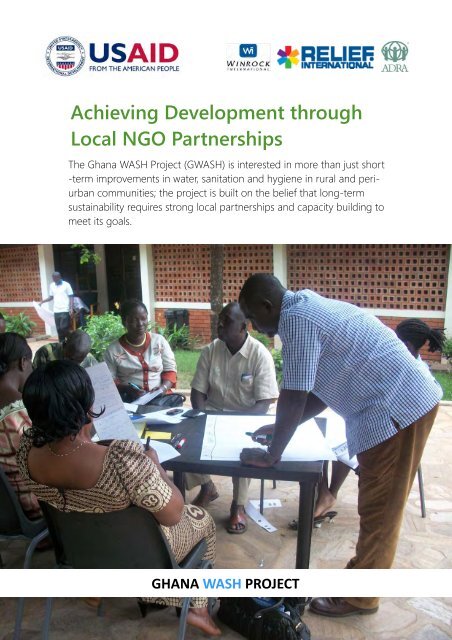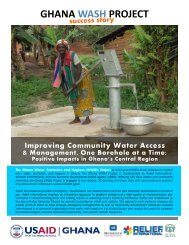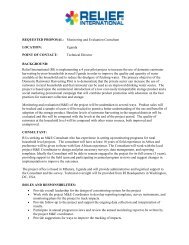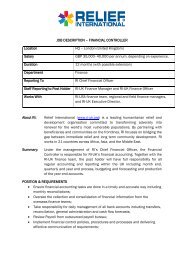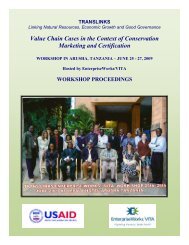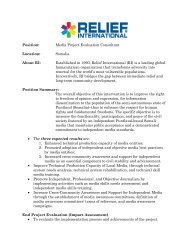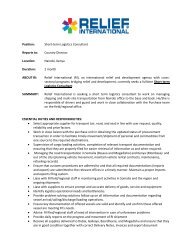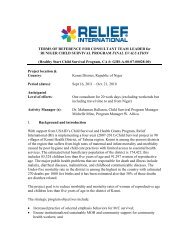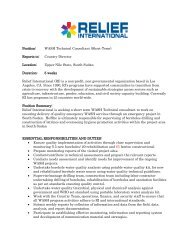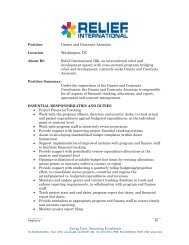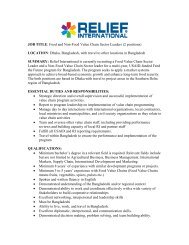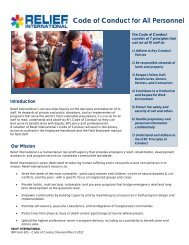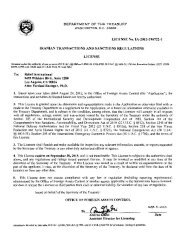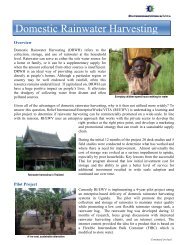Ghana WASH Project Success Story - Relief International
Ghana WASH Project Success Story - Relief International
Ghana WASH Project Success Story - Relief International
Create successful ePaper yourself
Turn your PDF publications into a flip-book with our unique Google optimized e-Paper software.
Achieving Development through<br />
Local NGO Partnerships<br />
The <strong>Ghana</strong> <strong>WASH</strong> <strong>Project</strong> (G<strong>WASH</strong>) is interested in more than just short<br />
-term improvements in water, sanitation and hygiene in rural and periurban<br />
communities; the project is built on the belief that long-term<br />
sustainability requires strong local partnerships and capacity building to<br />
meet its goals.<br />
GHANA <strong>WASH</strong> PROJECT
Vincent Darkey-Mensah (EDSAM Director) facilitates a community education<br />
discussion on proper excreta disposal and household latrine usage.<br />
Across five regions, the<br />
<strong>Ghana</strong> <strong>WASH</strong> <strong>Project</strong> is<br />
working alongside nine<br />
local NGOs to carry out<br />
its development activities.<br />
Through these local<br />
organizations, the<br />
project has a direct link<br />
to connect with and<br />
support rural and periurban<br />
communities.<br />
In order to work with local communities<br />
throughout the country,<br />
G<strong>WASH</strong> has established strong partnerships<br />
with a network of local non<br />
-government organizations<br />
(LNGOs). These partnerships allow<br />
G<strong>WASH</strong> to not only address pressing<br />
water, sanitation and hygiene<br />
issues, but also provide long-term<br />
sustainable development through<br />
trainings, workshops, seminars, and<br />
on-site training.<br />
In 2006, Mr. Vincent K. Darkey-<br />
Mensah and his wife, Mrs. Esinu<br />
Darkey-Mensah, created the Engineering<br />
and Development Services<br />
Administration and Management<br />
(EDSAM) Social Network. They<br />
founded the NGO on their passion<br />
to promote social and economic<br />
advancement in rural communities,<br />
on the need for water, sanitation,<br />
health, and business development<br />
for the rural poor and with a mission<br />
to provide comprehensive support<br />
services. With these themes in mind,<br />
the couple based their organization<br />
in Ho Municipality, the capital of the<br />
Volta Region. They also worked in<br />
five other districts -- Hohoe Municipality,<br />
Kadjebi District, Akatsi District,<br />
South Tongu District and North<br />
Tongu District.<br />
Since its start six years ago, the organization<br />
has grown substantially in<br />
both size and scope. Today, ED-<br />
SAM’s team includes 11 staff members,<br />
including four field staff. It has<br />
deepened its experience in the water,<br />
sanitation and hygiene (<strong>WASH</strong>)<br />
sector, focusing both on facilities<br />
and promoting positive hygiene and<br />
behavior change.<br />
In its efforts to promote water and<br />
sanitation development and health<br />
education, EDSAM mobilizes, educates<br />
and trains communities. In<br />
addition, EDSAM promotes household<br />
latrine construction, usage, and<br />
provides user education on proper<br />
operations and maintenance.<br />
In order to execute its community<br />
development and engagement activities,<br />
G<strong>WASH</strong> identifies and links<br />
with LNGOs as a key part of its sustainability<br />
model. EDSAM, with its<br />
experience and organization<br />
strengths as well as high recommendations,<br />
made it a strong contender<br />
for partnerships. In five years, ED-<br />
SAM has developed a strong track<br />
record for making a difference in<br />
local communities. The organization<br />
also possessed key local knowledge<br />
and experience in the <strong>WASH</strong> sector,<br />
from work with hardware (improving<br />
and providing facilities) and software<br />
(promoting positive hygiene and<br />
behavior change). Over time, the<br />
organization had developed experience<br />
in contract management, administration<br />
and procurement. Additionally,<br />
EDSAM had high recommendations<br />
from the Ho General<br />
Assembly. So in 2010, EDSAM became<br />
an LNGO partner with the<br />
project, which meant continuing to<br />
serve communities throughout the<br />
Volta Region, and also expanding its<br />
scope, which would require building<br />
its organizational and staff capacity.<br />
In the Volta Region, the <strong>Ghana</strong><br />
<strong>WASH</strong> <strong>Project</strong> has lofty water, sanitation,<br />
and hygiene goals: constructing<br />
five boreholes, three small-town<br />
piping systems, three institutional<br />
latrines, and 531 household latrines.<br />
These facilities, and the corresponding<br />
and complementary BCC activities,<br />
have the potential to impact<br />
dozens of communities and thousands<br />
of people in rural and periurban<br />
areas. The partnership is<br />
working to making a difference in<br />
the lives of more than 4,200 people<br />
through household latrine construction<br />
and more than 2,500 students<br />
through the construction of three<br />
institutional latrines, ensuring access<br />
to improved sanitation facilities.<br />
G<strong>WASH</strong> expects to benefit 7,500<br />
people through improved water<br />
infrastructure and improved access<br />
2 <strong>Ghana</strong> <strong>WASH</strong> <strong>Project</strong> | September 2012
new experiences, knowledge and<br />
confidence are impacting her work.<br />
“I have never worked in this field<br />
before,” she said. “With the training<br />
provided by G<strong>WASH</strong>, I am confident<br />
holding community meetings with<br />
chiefs and high-level officials.”<br />
Esther Nyonator (EDSAM Field Officer) gathers community data from a community<br />
member in Abutia Kpota, Volta Region. The <strong>Ghana</strong> <strong>WASH</strong> <strong>Project</strong> is undertaking<br />
community-led total sanitation activities in this community.<br />
to potable drinking water.<br />
The project is also implementing<br />
Behavior Change & Communication<br />
(BCC) activities in 33 communities<br />
and four schools across Volta. These<br />
activities will strengthen the impact<br />
of the physical facilities; the aim is to<br />
empower individuals and communities<br />
with an understanding of the<br />
role of water, sanitation and hygiene<br />
in their lives and the knowledge and<br />
skills to support and maintain their<br />
facilities.<br />
Building a Local<br />
Organization’s Capacity<br />
The partnership with EDSAM began<br />
with a heavy focus on capacity<br />
building trainings for the organization’s<br />
team, to ensure the project<br />
could obtain its projected water,<br />
sanitation, and hygiene goals. This<br />
type of capacity building provides<br />
EDSAM staff with practical information<br />
and resources to better support<br />
their local communities. EDSAM staff<br />
is trained on how to facilitate community<br />
mobilization, capacity building,<br />
monitoring/follow-up, organizing<br />
community meetings, BCC delivery,<br />
SHEP activities, and to report<br />
monthly and quarterly to the <strong>Ghana</strong><br />
<strong>WASH</strong> team. EDSAM’s ability to<br />
learn and effectively apply these<br />
skills has a significant impact on<br />
both EDSAM and the communities<br />
in which they work.<br />
The EDSAM team learned about the<br />
various project approaches and<br />
tools, such as using Participatory<br />
Health and Hygiene Education<br />
(PHHE) tool kits, a set of sketches<br />
depicting both positive and negative<br />
hygiene behaviors that facilitators<br />
use to communicate, collect, educate,<br />
and monitor communities’<br />
water sanitation behavior. The<br />
team’s training included skills in<br />
community entry, building a strong<br />
rapport with community members<br />
and leadership at the beginning of a<br />
watsan project; and they also honed<br />
skills in facilitation, for their field staff<br />
to serve as BCC agents and communicate<br />
and dialogue with communities<br />
concerning behavior change<br />
messages.<br />
“Working with G<strong>WASH</strong> has helped<br />
with staff retention,” Mr. Darkey-<br />
Mensah said. “With G<strong>WASH</strong>, we<br />
have regular cash flow to carry out<br />
our activities in the communities.<br />
The staff have also benefited from<br />
training programs.”<br />
Faith Amevor, an EDSAM field staff<br />
officer new to the community development<br />
field, explained how her<br />
She went on to describe her new<br />
skills, including conducting trainings<br />
for both small and large audiences.<br />
“My colleagues and I have learned<br />
about effective leadership, facilitation,<br />
accurate record keeping, monitoring/follow-up<br />
and working with<br />
diverse groups,” she said. “The<br />
greatest benefit is that we are also<br />
able to train others in our community<br />
on these skills.”<br />
Leading Community<br />
Development with Local<br />
Knowledge<br />
For Volta Region project activities,<br />
EDSAM is essential to ensuring sustainable,<br />
high-level impacts are realized,<br />
and the project works through<br />
EDSAM in numerous ways to implement<br />
software activities and facilitate<br />
and monitor hardware activities in<br />
the Volta Region.<br />
These activities include experiencesharing<br />
workshops, where experienced<br />
and novice field agents share<br />
stories and experiences from the<br />
field. The organization also facilitates<br />
the formation and training of water<br />
and sanitation (watsan) committees<br />
in communities; these committees<br />
created to administer, operate, and<br />
maintain the water, sanitation and<br />
hygiene facilities – the boreholes,<br />
hand-dug wells and latrines – that<br />
they receive through the project.<br />
The watsan committees identify and<br />
recruit community-based health<br />
promoters, who deliver effective<br />
behavior change messages, such as<br />
on stopping open defecation, and<br />
taking up proper hand-washing<br />
techniques to the communities.<br />
These promoters also assist in monitoring<br />
and evaluating these behavior<br />
changes in the community.<br />
3 <strong>Ghana</strong> <strong>WASH</strong> <strong>Project</strong> | September 2012
With G<strong>WASH</strong>, we have regular cash flow to carry out our<br />
activities in the communities. The staff have also benefited<br />
from training programs.<br />
— Vincent Darkey-Mensah, EDSAM Managing Director<br />
Watsan committees organize community<br />
savings accounts that is used<br />
to fund future maintenance and if<br />
necessary, to expand the water system.<br />
The creation of watsan committees<br />
provides a dynamic means<br />
of capacity building. Through creation,<br />
EDSAM and G<strong>WASH</strong> field staff<br />
train the community leadership<br />
team on the skills needed to create<br />
committees, on record keeping,<br />
organization, administration, and<br />
perhaps most importantly, problem<br />
solving for the watsan issues that<br />
may arise in the community.<br />
EDSAM also trains agents in behavior<br />
change communications, and<br />
these agents in turn conduct School<br />
Health Education Program (SHEP)<br />
activities in area schools. The LGNO<br />
partner also monitor the food vendors<br />
who provide food to students<br />
on school campuses, and the teachers<br />
and staff on the premises, with<br />
the aim of encouraging the adoption<br />
of appropriate food hygiene<br />
behavior.<br />
Organizational Development<br />
and New Opportunities<br />
EDSAM’s progression is evident on<br />
the G<strong>WASH</strong> side of the partnership.<br />
Avril Kudzi, G<strong>WASH</strong> Deputy Chief of<br />
Party, oversees LNGO contracts,<br />
their monthly and quarterly reports<br />
of field activities and monitors their<br />
budget activities. “We have seen<br />
tremendous improvements in project<br />
reporting and financial management,”<br />
she said.<br />
She went on to describe how far<br />
along EDSAM has come since first<br />
joining the project. “The field staff is<br />
more confident at community activities,”<br />
she said, “and through this,<br />
EDSAM was awarded a small grant<br />
to train more artisans for household<br />
latrine construction.”<br />
In March 2012, EDSAM was<br />
awarded a small grant to carry out a<br />
series of trainings for latrine artisans,<br />
Angela Owusu-Adama of IMPACT, a <strong>Ghana</strong> <strong>WASH</strong> <strong>Project</strong> local NGO partner in Awutu Senya District, Central Region, leads a<br />
capacity building training for local water and sanitation committee members.
“With the training provided by G<strong>WASH</strong>, I am confident holding<br />
community meetings with chiefs and high-level officials”<br />
— Faith Amevor, EDSAM Field Officer<br />
local masons who are employed by<br />
communities to construct household<br />
latrines. The Small Grants Facility is a<br />
source of funding that can be used<br />
to support local solutions to the<br />
challenges facing the <strong>WASH</strong> sector.<br />
The facility provides seed funding<br />
for innovative, locally-driven solutions<br />
and activities, and proposals<br />
for small grants are reviewed by a<br />
committee.<br />
The small grant funded the training<br />
for 43 latrine artisans, increasing the<br />
number of overall artisans to support<br />
the construction of household<br />
latrines in Volta Region, as well as<br />
Central Region and Western Region;<br />
11 others made up of LNGO staff,<br />
Peace Corps Volunteers and environmental<br />
health assistants also<br />
participated in the training.<br />
Evidence of Positive<br />
Community Impacts<br />
Communities are seeing the impact<br />
of the G<strong>WASH</strong> project and EDSAM<br />
is playing a remarkable role. Above<br />
all, the communities, who are at the<br />
heart of the project, are experiencing<br />
the greatest gain from this successful<br />
partnership.<br />
The support to School Health Education<br />
Program (SHEP) activities in<br />
the beneficiary schools is reaping<br />
benefits. In communities, school<br />
compounds are cleaner, and students<br />
are adopting the proper techniques<br />
for hand washing, personal<br />
hygiene, and the maintenance of<br />
the institutional latrines. Food vendors<br />
are also changing their behaviors,<br />
including adopting proper hand<br />
washing practices and improving the<br />
hygiene of the food they sell and<br />
serve to the students, teachers and<br />
staff.<br />
Recently, the community of Asukawkaw<br />
in the Krachi East District<br />
inaugurated a water treatment center,<br />
a water purification system that<br />
takes water from the nearby water<br />
source and treats it to provide potable,<br />
safe drinking water for the community.<br />
The members of the com-<br />
Faith Amevor (EDSAM field staff) and Vincent Darkey-Mensah (EDSAM director) perform latrine user education.
munity no longer queue or fight for<br />
water at the fetching point. Some<br />
community members have mentioned<br />
that they now have more<br />
time for their farm work. In the community<br />
of Tsyome Lomnava, the<br />
community members said the stomach<br />
aches associated with the<br />
stream water they used to drink has<br />
stopped now that they are drinking<br />
treated water.<br />
The Essentiality of Capacity<br />
Building for Long-Term<br />
Community Development<br />
Capacity building is an integral part<br />
of the <strong>Ghana</strong> <strong>WASH</strong> <strong>Project</strong>’s work<br />
with its LNGOs and its communities,<br />
because these collaborations with<br />
LNGOs like EDSAM represent an<br />
opportunity to build the local capacity<br />
of homegrown organizations that<br />
can then take charge of their community’s<br />
development, contributing<br />
to long-term sustainability. In many<br />
cases, such as that of EDSAM, these<br />
LNGOs are already making strong,<br />
positive impacts in communities. In<br />
addition, these collaborations and<br />
partnerships are opportunities to<br />
organizations creates a cadre of<br />
skilled, local NGO professions who<br />
have the ability to see their community<br />
needs, can access funding to<br />
support their communities’ activities,<br />
and can monitor and evaluate their<br />
activities to ensure effective, sustainable<br />
impacts.<br />
Across its five regions, the <strong>Ghana</strong><br />
<strong>WASH</strong> <strong>Project</strong> partners with nine<br />
LNGOs, including EDSAM, who provide<br />
services for pro-poor development<br />
in more than 160 communities.<br />
Like EDSAM, these LNGOs are<br />
focused on creating solutions and<br />
establishing partnerships to implement<br />
these solutions.<br />
In Nyive, Strengthening EDSAM is Shaping<br />
Positive Impacts for Community Sanitation<br />
Nyive is a small town located 10<br />
kilometers east of Ho, the capital city<br />
of the Volta Region. When approaching<br />
the unassuming community,<br />
it is hard to imagine that it is<br />
home to 2000 people. Driving into<br />
the center of town, the presence of<br />
external aid is evident: One of the<br />
first sights is the USAID/Rotary <strong>International</strong><br />
built water tower, which<br />
provides not only potable water to<br />
this community, but also provides<br />
shade on sunny days to the vendors<br />
of tomatoes, dried fish, and soap.<br />
As with most small, rural communities<br />
in this region, there is the familiarity<br />
with development aid coming<br />
from outside. As our <strong>Ghana</strong> <strong>WASH</strong><br />
<strong>Project</strong> vehicle pulled up into town<br />
that sweltering afternoon, the community<br />
greeted us without fanfare.<br />
The purpose of this visit was to follow-up<br />
on the impact of <strong>Ghana</strong><br />
<strong>WASH</strong> and EDSAM activities and<br />
their benefits to communities, and<br />
to verify the number of constructed<br />
household latrines.<br />
Nyive, like many rural communities<br />
outside of Ho, experiences tremendous<br />
challenges with water and<br />
sanitation access, and community<br />
hygiene. Nyive’s water infrastructure<br />
challenges are being addressed, in<br />
part, through a partnership between<br />
USAID and Rotary <strong>International</strong>:<br />
With EDSAM, the partners are addressing<br />
the water and sanitation<br />
challenges with infrastructure and<br />
hygiene with behavior change communications,<br />
and have a water<br />
pump, water tower, and a small<br />
town piping system.<br />
Mr. P. K. Nyame, Water Board<br />
Chairman, says that the biggest<br />
challenge is that some people don’t<br />
understand or see the need for<br />
proper sanitation, and it is difficult to<br />
make them understand the system,<br />
because they don’t see or understand<br />
the harm that poor sanitation<br />
practices cause.<br />
EDSAM is increasing the understanding<br />
of the Nyive community on<br />
watsan issues, such as open defecation,<br />
through intense positive behavior<br />
change communication messages.<br />
This task is designated to<br />
hygiene promoters within the Nyive<br />
community. Hygiene promoters are<br />
community-based volunteers who<br />
are taught how to effectively deliver<br />
behavior change communication<br />
messages. They are also taught and<br />
assist EDSAM in monitoring and<br />
evaluating the progress of the community.<br />
EDSAM’s training with <strong>Ghana</strong> <strong>WASH</strong><br />
enables them to successfully source<br />
and select people who are engaged<br />
and committed to changing the<br />
Nyive doesn’t just have visions; they<br />
have plans on how to attain their goals,<br />
thanks to the training and mentoring<br />
they have received from EDSAM.<br />
6 <strong>Ghana</strong> <strong>WASH</strong> <strong>Project</strong> | September 2012
community, because they now have<br />
the education to do more.<br />
At left, a walkway behind beneficiary’s home in Nyive, Volta Region, before community<br />
cleanup. At right, the same walkway, after the community cleanup.<br />
behavior of their community. Nyive<br />
currently has four hygiene promoters<br />
who are responsible for sensitizing<br />
the community on the harmful<br />
effects of open defecation, continuing<br />
“triggering” and education<br />
events, ensuring consistent messages<br />
to the community and assisting<br />
with the formation of school<br />
health education programs (SHEP).<br />
Hygiene promoters learn skills that<br />
can be used far beyond the reaches<br />
of watsan; they are trained on record<br />
keeping, monitoring and follow<br />
-up, how to deliver messages and<br />
presentations to effectively reach<br />
their audience, and conflict resolution.<br />
In addition to supporting community<br />
hygiene promoters, the EDSAM<br />
team has used their skills to build<br />
the capacity of Nyive’s existing Water<br />
and Sanitation Development<br />
Board. The board consists of a<br />
chairman, secretary, treasurer, plus<br />
six additional members. These individuals<br />
are democratically elected<br />
with the operational tasks of holding<br />
meetings, providing instruction on<br />
how to address community watsan<br />
issues, general clean-up of the community,<br />
ensuring there are trained<br />
personnel in the community to repair<br />
and maintain watsan facilities,<br />
and handling funds and fees. ED-<br />
SAM has also worked with the Nyive<br />
board to build their capacity on effectively<br />
mobilizing the community,<br />
disseminating water, sanitation and<br />
hygiene messages, generate demand<br />
for watsan infrastructure and<br />
promote proper infrastructure use<br />
and maintenance. Capacity building<br />
of the watsan development board<br />
also includes adopting and updating<br />
constitution and bylaws, instituting<br />
proper user-fee collection practices,<br />
and practicing transparent financial<br />
management and civic participation.<br />
Mr. Nyame said that involvement<br />
with organizations like EDSAM enable<br />
communities to learn for themselves,<br />
so that they can provide for<br />
their communities in the future. Mr.<br />
Nyame continued that Nyive has<br />
land that could be used as financial<br />
resources, but because of the open<br />
defecation problems, much of the<br />
land went unused and the community<br />
was hurting as a whole.<br />
Since the involvement of EDSAM<br />
and the <strong>Ghana</strong> Wash <strong>Project</strong>, the<br />
community is seeing a change for<br />
the better. Through a trickle-down<br />
effect, the Nyive community has<br />
benefitted tremendously from the<br />
training EDSAM received from the<br />
<strong>Ghana</strong> <strong>WASH</strong> <strong>Project</strong>: The board<br />
has learned skills like proper bookkeeping,<br />
roles and responsibilities,<br />
how to manage committees, how to<br />
productively interact with the community<br />
and meet their needs. This<br />
knowledge makes everyone responsible<br />
for the success or failure of the<br />
When asked what changes they are<br />
seeing from these partnerships and<br />
what is Nyive doing to sustain their<br />
community, community members<br />
provided affirming responses. First,<br />
since the introduction of the project,<br />
the community has received 35<br />
household latrines and one institutional<br />
latrine, and more and more<br />
people are requesting latrine construction,<br />
demonstrating a high demand<br />
for infrastructure and for the<br />
opportunity to improve sanitation<br />
access. Hygiene promoters are seeing<br />
fewer and fewer instances of<br />
open defecation on open land. The<br />
community has shown a more<br />
vested interest in cleaning up their<br />
community through clean up days,<br />
where the community gets together<br />
and cleans an area to make it free of<br />
trash, debris and open defecation.<br />
The Nyive community has bigger<br />
plans than just clean up days; they<br />
want to build public toilets for those<br />
who cannot afford to build their<br />
own household latrines and also<br />
add piping to increase the reach of<br />
potable water to outlying areas.<br />
Nyive doesn’t just have visions; they<br />
have plans on how to attain their<br />
goals, thanks to the training and<br />
mentoring they have received from<br />
EDSAM. Nyive currently charges for<br />
water by the bucket and that money<br />
is used to maintain and repair the<br />
water facilities, and a small portion is<br />
being saved to purchase piping for<br />
their goal of providing water to Nyive<br />
community members that are<br />
further from the town center.<br />
“If we continue to clean up our land<br />
and become open defecation free,<br />
than we can sell or lease the land<br />
and use that money to build public<br />
toilets, and increase behavior<br />
change communication messages<br />
trainings to increase the health and<br />
cleanliness of our community” said<br />
Tefe Norfeli, a community hygiene<br />
promoter.<br />
7 <strong>Ghana</strong> <strong>WASH</strong> <strong>Project</strong> | September 2012
The <strong>Ghana</strong> Water, Sanitation and Hygiene <strong>Project</strong> is a four-year USAID-funded initiative to improve rural water, sanitation,<br />
and hygiene in <strong>Ghana</strong>. G<strong>WASH</strong> is implemented by <strong>Relief</strong> <strong>International</strong>, Winrock <strong>International</strong>, and the Adventist Development <strong>Relief</strong><br />
Agency (ADRA). Working with local actors and community members, G<strong>WASH</strong> is engaged in five regions, 22 districts, and more than<br />
160 communities to assist in the achievement of <strong>Ghana</strong>’s national <strong>WASH</strong> goals.<br />
<strong>Relief</strong> <strong>International</strong> provides emergency, rehabilitation and development services that empower beneficiaries in the process. <strong>Relief</strong> <strong>International</strong><br />
employs an innovative approach to program design and a high quality of implementation performance in demonstrating deep<br />
and lasting impact in reducing human suffering worldwide. ADRA was established by the Seventh-day Adventist Church to provide<br />
humanitarian relief and welfare. The agency’s work seeks to improve the quality of life of those in need through emergency management<br />
as well as community development initiatives. Winrock <strong>International</strong> is a non-profit organization working with people in the<br />
United States and around the world to empower the disadvantaged, increase economic opportunity, and sustain natural resources.


